- Home
- Anthony Bourdain
Anthony Bourdain: The Last Interview
Anthony Bourdain: The Last Interview Read online
ANTHONY BOURDAIN: THE LAST INTERVIEW AND OTHER CONVERSATIONS
Copyright © 2019 by Melville House Publishing
First Melville House printing: August 2019
“Cooking Up a Mystery: An Interview with Anthony Bourdain” © 2003 by Jessica Bennett. First published in Rain Taxi Review of Books in Summer 2003.
“Medium Raw: In Conversation with Anthony Bourdain.” © 2011 by Jill Dupleix. Presented by The Sydney Writers’ Festival on May 21, 2011.
“Anthony Bourdain Dishes on Food.” © 2013 by Neil deGrasse Tyson. First appeared on Star Talk with Neil deGrasse Tyson on April 7, 2013.
“Anthony Bourdain Talks Travel, Food, and War.” © 2014 by John W. Little. First published on Blogs of War on July 20, 2014.
“Anthony Bourdain on Food: There’s Nothing More Political.” © 2016 by Canadian Broadcasting Corporation. First appeared on CBS News’ On the Money with Peter Armstrong on November 7, 2016. Used with permission from CBC Licensing.
“Telling Stories Through Food on ‘Parts Unknown.’ ” © 2018 by Viacom. First appeared on Comedy Central’s The Daily Show with Trevor Noah on January 17, 2018.
“The Last Interview: Anthony Bourdain on Asia Argento, His Favorite Movies, and Why Trump Would Be a Terrible Dinner Companion.” © 2018 by Penske Media Corporation. First published on IndieWire on June 3rd, 2018. Used with permission from Wright’s Media as agent for Penske Media Corporation.
Melville House Publishing
46 John Street
Brooklyn, NY 11201
and
Suite 2000
16/18 Woodford Road
London E7 0HA
mhpbooks.com
@melvillehouse
ISBN: 9781612198248
Ebook ISBN 9781612198255
A catalog record for this book is available from the Library of Congress.
v5.4
a
CONTENTS
Cover
Title Page
Copyright
INTRODUCTION BY HELEN ROSNER
COOKING UP A MYSTERY: AN INTERVIEW WITH ANTHONY BOURDAIN
Interview with Jessica Bennett
Rain Taxi Review of Books
Summer, 2003
MEDIUM RAW: IN CONVERSATION WITH ANTHONY BOURDAIN
Interview with Jill Dupliex
On stage at the Sydney Writers’ Festival
May 21, 2011
ANTHONY BOURDAIN DISHES ON FOOD
Interview with Neil deGrasse Tyson
StarTalk with Neil deGrasse Tyson
April 7, 2013
ANTHONY BOURDAIN TALKS TRAVEL, FOOD, AND WAR
Interview with John W. Little
Blogs of War
July 20, 2014
ANTHONY BOURDAIN ON FOOD: THERE IS NOTHING MORE POLITICAL
Interview with Peter Armstrong
CBC News On the Money
November 7, 2016
TELLING STORIES THROUGH FOOD ON “PARTS UNKNOWN”
Interview with Trevor Noah
The Daily Show with Trevor Noah
January 17, 2018
THE LAST INTERVIEW: ANTHONY BOURDAIN ON ASIA ARGENTO, HIS FAVORITE MOVIES, AND WHY DONALD TRUMP WOULD BE A TERRIBLE DINNER COMPANION
Interview with Eric Kohn
IndieWire.com
June 3, 2018
About the Authors
The Last Interview Series
INTRODUCTION
HELEN ROSNER
Right after high school, I spent an entire summer staring at Anthony Bourdain’s face. After graduation, I had wrangled a job at the Seminary Co-op Bookstore in Chicago, where I spent thirty hours a week ringing up customers at a hiccupy, green-screen register terminal. For me, the summer was a prairie stretching out into hazy infinity; I was leaving for college at the end of it, but ten weeks may as well have been a hundred years. The bookstore was serious and scholarly, independent but affiliated with a major university, and it was strictly stocked: no kids’ books, no cookbooks, no travel, no genre fiction. Our inventory’s few concessions to a buyer’s impulse to make impulse buys lived by the register, piled in a few short stacks, their spines becoming as familiar to me as the back of a crush’s neck. I don’t know how trustworthy my memory is anymore, but I remember ringing up a copy of Kitchen Confidential, Bourdain’s just-published memoir and that summer’s runaway hit, every fourth or fifth customer—locking eyes a half a dozen times an hour with the white-clad, knife-holding author on the cover, his sharp cheeks and pursed lips framing a Mona Lisa glare.
Store employees weren’t technically supposed to read on the job, but what else was there to do? I worked my way through Bourdain’s book in bites and gulps over the course of a week, reading half a chapter until a customer arrived, then selling them the copy in my hand. Did reading Kitchen Confidential change my life? Hard to say. I was nineteen, soft-handed, drowning in my own wishes and terrors, a kitten with its eyes still closed. What could I have believed about fancy restaurants, that this book upended my notions of their sanctity? What could I have known about food writing that it shattered my sense of its limits?
The book did, of course, change everything—for restaurant-goers and for writers, and most powerfully, for cooks, who were, in a single instant, as if from on high, delivered a spokesman, and champion, and poet laureate. It also explosively changed everything for Bourdain himself. He was 44 years old when Kitchen Confidential was published, and he thought of this memoir as an endcap to his career: a way to stuff and mount those bone-splintering years spent working the line, wringing some value (literary, monetary) from his lost years, his time as a junkie and then getting clean, the splendor and indignity of a cook’s jagged life. The book’s more practical secret-spilling quickly took on the patina of conventional wisdom—everyone, it seems, now knows not to order fish on Mondays, and to steer clear of the refrigerator dumping ground of an off-menu frittata special, even if they don’t always know where that knowledge came from.
Readers may have bought the book to get insight into a world ten feet from their dinner table, but it was Bourdain the man who kept us reading—the character on the page, the voice recounting the story. To me, a teenager in a half-slouch behind the counter at the bookstore, each page was an astonishment: raunchy and vicious and wild, all of it in prose sharp as a scimitar. Bourdain is best known, now, for his extraordinary television career, and he’s most often categorized as a cook, but to me he’s always a writer—he’s the author of some dozen books, and uncountable essays and blog posts and show notes—and Kitchen Confidential is the knuckle-crack of a fighter getting ready to wallop. I still catch my breath reading his description of the palms of a fearsome chef, a line that wouldn’t be out of place in Moby-Dick: “The hideous constellation of water-filled blisters, angry red welts from grill marks, the old scars, the raw flesh where steam or hot fat had made the skin simply roll off.”
* * *
—
Despite my love affair with Kitchen Confidential, I didn’t read another Bourdain book until around 2014, after deciding that I probably ought to understand why this Bourdain guy was still such a big deal. Like most former teenaged bookstore employees, I’d figured that one day I’d end up being a writer, but it had been something of a surprise that I’d ended up writing about food and restaurants. Still, some contrary impulse in me refused to engage even a little with Bourdain’s career, assuming—based on his omnipresence, his tremendous success, and his universal belovedness, not to m
ention that he was all anyone talked about when we talked, endlessly, about bad-boy tattooed chefs and their rock-star lives—that he was probably an overrated hack.
I started with Medium Raw, the putative sequel to Kitchen Confidential, published ten years later and being, more or less, a meditation on the wild fame that followed the first book’s publication. He had me from the first line: “I was so supremely naive about so many things when I wrote Kitchen Confidential,” the book begins, then runs in a stream of consciousness from chapter to chapter: marveling at the absurdities of private air travel, eviscerating the sanctimony of Alice Waters, exploring the strange sensuality of writing about food, grappling with his conflicting feelings about still being called “chef” despite not, technically speaking, being the chief of anyone anymore. He writes about being recognized by a young cook at a bar: “ ‘Fuck you,’ he says. ‘You don’t even cook. You’re not one of us anymore.’ Far from being offended (though I am hurt), I want to give him a big hug. Another drink or two, and I just might.”
What I hadn’t realized before reading Medium Raw was that Bourdain had written it as a corrective. The bro-chef culture that Kitchen Confidential had illuminated and invigorated had metastasized way beyond Bourdain’s comfort zone—he was already done with life as a cocky, drug-addled cowboy by the time Kitchen Confidential was published, but to some of his readers, it would always be written in the present tense. To his great discomfort, wherever he went, young cooks would offer to get high with him, or brag about screwing their co-workers during service, or stealing cash, or doing unspeakable things to the produce inventory. Medium Raw is an uneven book, a collection of ideas and memories—some sections read like outtakes from Kitchen Confidential—but its best moments are among Bourdain’s most indelible work. But by the time it came out, in 2010, Bourdain’s television celebrity was so massive that another book—even one dishing on all the T.V. secrets—was pretty much just a radar blip.
The shows, when I tracked them down in reruns, were even better. From the beginning, in the Food Network show A Cook’s Tour, which began production just a few months after Kitchen Confidential hit shelves, Bourdain’s voice was true. In the early days you can see how much he wanted to make sure we knew he was cool; as he eased into his on-camera self over the years, you can almost watch the affect falling away, the posture of cynical indifference giving way to more of a nihilist delight.
After two years with the Food Network, Bourdain launched a new show with the Travel Channel, No Reservations—a bigger, smarter, more idiosyncratic eating-around-the-world show. This eventually led to a deal with CNN, where Bourdain and his team produced what is likely the pinnacle of the travel form. Anthony Bourdain: Parts Unknown was ostensibly a food show, but it’s more accurate to think of it as a brutally beautiful documentary series, or a ballistic missile of pure humanity, a meticulous and often radically compassionate exploration of not only what people eat around the world, but the deep and indelible why: the wars, the zoning laws, the climate disasters, the religious strife, the historical necessity. He went to beautiful, vacation-ready locations, but also filmed powerful and humanizing episodes in places that to most of his viewers exist only in clichés of violence and poverty: Iran, Gaza, Congo, Madagascar, Libya, Cuba. Bourdain also made a point to turn the camera on America, and to give it the same unsparing combination of love and scrutiny that he brought everywhere else. “Like any other episode of Parts Unknown, whether in Vietnam or Nigeria or any city in the United States, this West Virginia episode is a plea for understanding of the people whose personal histories, sense of pride, independence, and daunting challenges deserve respect,” he wrote in his show notes for an episode unpacking the clichés of coal country. “It’s a walk in somebody else’s shoes.”
* * *
—
When Bourdain died, in 2018, it felt like the world was knocked off course. Death is always a shock, even when we see it coming, even if we’ve been watching it creep towards us all the way from the horizon. But Bourdain’s suicide was sudden, unfathomable. It felt like a mistake: surely it wasn’t him, surely it wasn’t real. It has been difficult for me to try to separate the sorrow of losing my friend Tony from the sorrow of losing Anthony Bourdain, Public Figure. But the more I try to disentangle them, the more I begin to feel that there may not actually be all that much to disentangle.
At the news of his death, millions of people mourned—and not the way that we mourn a commodity celebrity, with a sharp breath of sorrow and a fleeting salute and a sad-face post on social media. Millions of people mourned Bourdain the way you mourn a friend: primal, personal, disbelieving, unreal, unhealed. The astronaut Scott Kelly, former commander of the International Space Station, wrote of Bourdain, “Following his travels while I was in space brought me home to our planet. He made me feel like I was walking barefoot over those places that were so far below. For a moment, while I watched his show, I felt a little bit like I was back on Earth, sticking my toes in the water of life.”
Being part of that great global outpouring of sorrow was unlike any public death I have ever experienced—a feeling of being unexpectedly untethered and left to drift, entirely alone, all together. The impact of his loss rippled outward for days, weeks, months—even now, it’s still raw, the space he left is still a gaping emptiness. The senselessness of his death is somehow more enormous, still, than the great work of his life. This will ease over time, I know: the open wound will close into a scar, the scar will fade into the crosshatched dullness of memory.
Most celebrities in the culinary world fit one category or another: you can loosely bundle together your domestic goddesses, your reality-tv judges, your globe-trotting trend-seekers, your toffee-nosed haute cuisine auteurs, all of them individually distinct but speaking, culturally, at comparable pitch and volume. Bourdain defied category, which means he defies replacement. There’s no other ex-line-cook memoirist, who’s also an advocate for culinary justice, who also makes the best goddamn show on television, who also has the ear of global leaders, who also reads a hundred books a year and knows every film ever made, and has the irresistible charisma of a black hole, and writes like a burning knife, and wears his anger and his sadness on the outside, right next to his delight. When he died, he was at the pinnacle of his career, riding a wave of professional and creative fecundity, by most measures deeply fulfilled in his personal relationships. He’d sent me a note a few days before, a flutter of empty and delicious gossip, and had then sent another when I didn’t answer quickly enough for his liking. In the days after he died, I stared at that last message in my inbox, the sarcastic demand for a reply, an unanswerable question.
* * *
—
Coincidentally, it was right in the middle of my self-imposed Bourdain immersion course that I met him—the real him, not the textually intermediated version of him—for the first time. This was where I ran into my Tony problem. Even after we became friends, I had a hard time calling Bourdain “Tony.” He would tease me about it, and speculate about which presumably deep Freudian well my resistance to his preferred name sprang from. “It’s because you take an intense professional interest in me,” he suggested, once, as an explanation, which I suspect came close to the truth—in print, he’s always Anthony Bourdain, no matter how much he’s Tony at home. And, maybe because of my self-imposed late exposure to his works, the particular nature of my professional interest was not about the substance of his career—the first time I formally interviewed him, a ninety-minute conversation recorded for the podcast the Eater Upsell, I admitted with embarrassment that I still had never seen any episodes of Parts Unknown—but instead about its form.
Bourdain seemed to me to be a fascinating specimen of celebrity. He was one of the best-known people in America, and possibly in the world, a notoriety on par with heads of state and Hollywood superstars, but his life lacked any of the insulation that normally comes with such a profile. He didn’t walk through Man
hattan with a security detail, or insist on photo approval, or barricade himself behind a battalion of publicists. The most striking thing to me was the closeness his fans felt to him—a genuine sense of friendship and communion, a sense of comfort with his intimate self. A few years ago I had coffee with a college student who wanted my advice on becoming a food writer. I asked him whose work he admired, and he didn’t even need a last name: “Tony, of course.”
Undoubtedly, part of Bourdain’s everyman appeal came from the fact that he was a prolific interviewee; journalists reaching out to him—usually by way of an email to his collaborator (and self-described gatekeeper) Laurie Woolever—were almost never met with a “no,” and the conversations in this volume are just a sliver of the vast public archive of his commentary. Here, he is his true, dynamic self, cranky and smart and utterly charming. But what’s most evident to me, in these particular selections, is how hard Bourdain fought against the flattening effects of fame, how urgent it was for him, always, to be a full and multidimensional person even in his public self—to have space to evolve in his craft, to inhabit new perspectives and priorities. He politely answers the same questions over and over, gently steering the conversation into the present: breezing past the drugs and crime and horrors of brunch, gently pointing out that he doesn’t really do the cobra-blood shtick anymore, pivoting to the eye-opening effects of fatherhood, the demands of creativity, the moral obligations of success and the illuminating benefits of being a professional curious outsider. “I used to think that basically, the whole world, that all humanity were basically bastards,” he tells John W. Little, in a 2014 interview for Blogs of War. “I’ve since found that most people seem to be pretty nice—basically good people doing the best they can.”
These interviews trace the arc of just fifteen years, from his early fame to shortly before the end of his life. Maybe it’s because Bourdain spent more adult years as a civilian than a celebrity, but the man talking about his hustler’s work ethic in the Rain Taxi Review of Books in 2003 is the same person leaning back in his chair in 2018, chatting with Trevor Noah in front of the cameras of the Daily Show about his rage at the President of the United States referring to El Salvador, Haiti, and the entire continent of Africa as “shithole countries.” There’s maybe a little more comfort, a little more authoritative confidence, a little more weariness in the voice. But he was, from the start to the finish, exactly himself. It was all there in Kitchen Confidential, if you go back, and you know what to read for: the story of a man looking for himself, going for glory, fucking up, and winning big, the whole time never quite sure if getting caught and getting away with it hadn’t actually been the same thing all along.

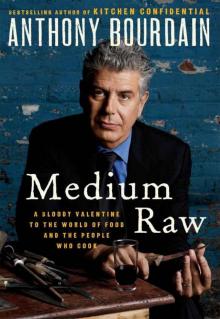 Medium Raw: A Bloody Valentine to the World of Food and the People Who Cook
Medium Raw: A Bloody Valentine to the World of Food and the People Who Cook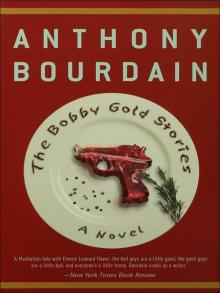 The Bobby Gold Stories
The Bobby Gold Stories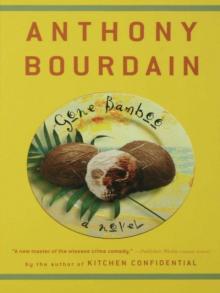 Gone Bamboo
Gone Bamboo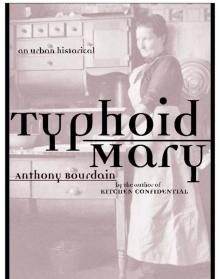 Typhoid Mary
Typhoid Mary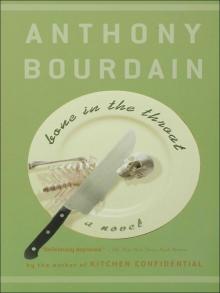 Bone in the Throat
Bone in the Throat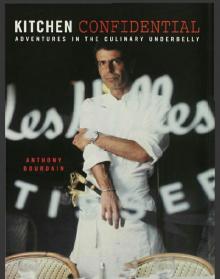 Kitchen Confidential
Kitchen Confidential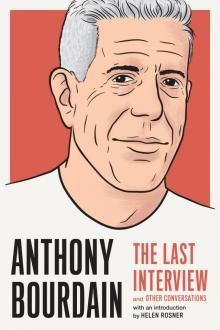 Anthony Bourdain: The Last Interview
Anthony Bourdain: The Last Interview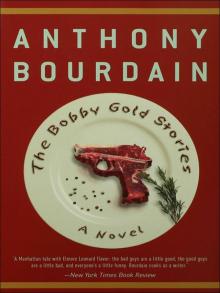 Bobby Gold Stories
Bobby Gold Stories